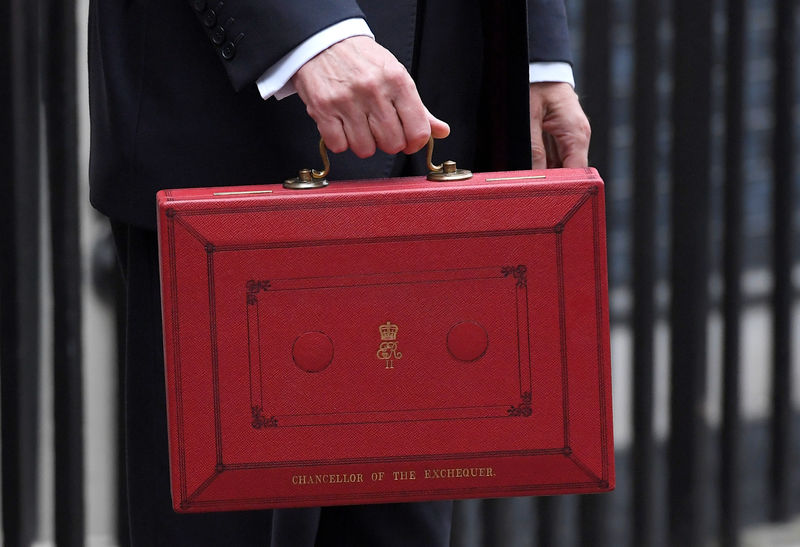 © Reuters. Britain’s Chancellor of the Exchequer Philip Hammond leaves 11 Downing Street to present his budget, London
© Reuters. Britain’s Chancellor of the Exchequer Philip Hammond leaves 11 Downing Street to present his budget, LondonBy Andy Bruce
LONDON (Reuters) – A grim Brexit budget that slashed growth forecasts but gave young voters a tax break on buying their first property may have placated critics of British finance minister Philip Hammond, at least for now.
Hammond was under intense pressure from within his own Conservative Party to spend money Britain doesn’t have on courting voters, though he is boxed in by uncertainty over the impact of Britain’s March 2019 exit from the European Union.
Despite outlining a somber outlook for economic growth and government borrowing, Hammond announced some spending steps aimed at winning back voters, in particular abolishing a property tax for most first-time home-buyers.
The plans were enough to win over Conservative lawmakers who had even been urging Prime Minister Theresa May before the budget to fire him for his cautious approach to Brexit and the public finances.
“I though he was relaxed, funny, competent and confident. He’s got my vote to stay where he is,” said one senior Conservative who has been critical of Hammond in the past.
The right-wing Daily Mail newspaper on Thursday declared Hammond was “Eeyore no more!”, referring to the glum donkey from A.A. Milne’s Winnie-the-Pooh books. Last month the paper had described him as treacherous and dismal.
“I’ve never been gloomy, I’m a pragmatist. I take the world as it is,” Hammond told BBC radio on Thursday.
The biggest-selling Sun newspaper praised efforts to put money back in voters’ pockets and said that Hammond had at last delivered a budget for its readers.
Other media, though, were skeptical about Hammond’s chances of keeping these critics on-side. A Financial Times opinion piece said “‘Box Office’ Phil does enough to survive, for now”.
The left-leaning Daily Mirror tabloid told Hammond: “Thanks for nothing”.
TROUBLE AHEAD?
The Office for Budget Responsibility (OBR) on Wednesday scythed its projections for economic growth in the coming years in the midst of a dire decade for productivity – the worst since 1812, according to the Resolution Foundation think-tank. [nL8N1NS25X]
Britain’s budget forecasters now expect gross domestic product will grow by 1.5 percent in 2017, compared with a forecast of 2.0 percent made in March. This contrasts with a world economy which the International Monetary Fund expects to expand by 3.6 percent in 2017 and 3.7 percent in 2018.
The revised projections underline the scale of the challenge for Hammond as May’s minority government tries to negotiate Britain’s exit from the EU.
Even the OBR’s downbeat outlook has yet to take into account the impact of Brexit, given that the nature of the exit deal is still unclear. Economists polled by Reuters assign a roughly one-in-three chance of a disorderly exit.
Compounding matters for Hammond, the squeeze on households looks likely to extend for years, with the OBR forecasting virtually no wage growth in inflation-adjusted terms for the next two years.
Hammond will remain under pressure to find more money for voters in their 20s and 30s who backed the opposition Labour Party in the June snap election which lost May her majority in parliament.
“We will all have to get used to the idea that steadily rising living standards may be a thing of the increasingly distant past,” said Paul Johnson, director of the Institute for Fiscal Studies.
($1 = 0.7515 pounds)
Fusion Media or anyone involved with Fusion Media will not accept any liability for loss or damage as a result of reliance on the information including data, quotes, charts and buy/sell signals contained within this website. Please be fully informed regarding the risks and costs associated with trading the financial markets, it is one of the riskiest investment forms possible.
Source: Investing.com





























